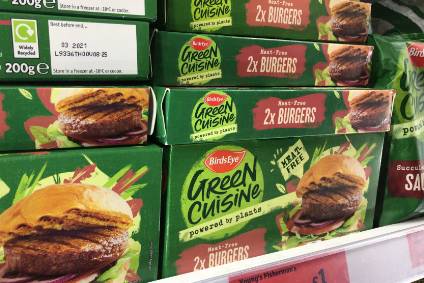
Nomad Foods, the frozen-food group behind brands including Birds Eye and Iglo, is concentrating its acquisition strategy on Europe after passing on a number of deals.
The UK-based business, which is listed in the US, is “refining” its approach to M&A by focusing on “European frozen acquisitions, which are primarily mid-sized in nature”, CEO Stéfan Descheemaeker said.

Discover B2B Marketing That Performs
Combine business intelligence and editorial excellence to reach engaged professionals across 36 leading media platforms.
Six years ago, the then Nomad Holdings was set up by FMCG veterans Martin Franklin – the founder of consumer goods giant Jarden – and Noam Gottesman, the co-founder of hedge fund GLG Partners, as a vehicle to make acquisitions.
Twelve months later, that vehicle became Nomad Foods through the purchase of European frozen-food business Iglo Group, a deal swiftly followed with the addition of a clutch of Findus Group assets. The company made two acquisitions in 2018, buying frozen pizza assets including the Goodfella’s brand from Boparan Holdings and snapping up UK-based frozen Yorkshire Pudding and roast potatoes maker Aunt Bessie’s from William Jackson Food Group.
On Thursday, alongside Nomad’s first-half results, the company announced plans to buy EUR500m (US$588.2m) of its own shares at a price expected to be between US$23 and $25.50.
“We raised equity 18 months ago to prepare ourselves for a slate of interesting acquisition opportunities that we saw ahead of us at the time. We have maintained our discipline by sticking to our acquisition criteria and ultimately passed on a number of deals,” Descheemaeker told analysts on a conference call to discuss the results.

US Tariffs are shifting - will you react or anticipate?
Don’t let policy changes catch you off guard. Stay proactive with real-time data and expert analysis.
By GlobalDataThe Nomad chief executive said the company, which also owns the Green Cuisine meat-alternative brand, had a “compelling and targeted pipeline” of potential targets, without disclosing their identities.
“You can’t plan these things but you have to be ready,” Descheemaeker said. “What we see is, with refined focus and with so much cash, we think it’s only the right thing to do to return cash to shareholders while leaving, obviously, enough cash and cash flow generation for this refined focus.”
Asked why Nomad had decided against moving for certain businesses, he added: “We’ve come up with a list of criteria … we remained very disciplined with this M&A criteria. And all these acquisitions didn’t pass the right test, sometimes in terms of valuation, sometimes in terms of quality of assets.
“M&A is also a game of patience. It is difficult because sometimes you are get too excited for something you have worked very hard for. At the same time, you should never forget, it’s about patience, it’s about discipline. And discipline in this context means for us that buying back our shares is, we think, the right investment. The decision to go to return cash to shareholders is just a manifestation of what the reality of the market is. We believe that with the balance sheet we have after the tender, with the cash flow generation we have – and we compare this with the kind of assets that are available and interesting assets – we believe that we can do them, because they’re mostly mid-size by nature today.”
Nomad has upped its forecasts on key sales and profitability metrics for 2020 as the company benefited from Covid-19-fuelled demand for frozen food.
The UK-based business, also home to brands including Iglo and Green Cuisine, is expecting its revenue to grow at a “high-single digit percentage range” on an organic basis in 2020. The company had been predicting growth at a “mid-single digit” rate. In 2019, Nomad generated EUR2.32bn (US$2.75bn) in revenue, which was 7% higher than 2018 and up 2.1% on an organic basis.
Nomad’s new forecasts also include an expectation its “adjusted EBITDA” will be “in excess of EUR460m”. The business had been forecasting EUR450-460m.
In the first six months of 2020, Nomad’s revenue rose 10.9% to EUR1.28bn, which equated to a 9.8% increase organically. Some 7.9 percentage points of that growth came from “volume/mix”, Nomad said.
“We see numerous avenues for growth within our European frozen food footprint, both organically and inorganically,” Descheemaeker said. “Organically, we have strong momentum and are making incremental strategic investments to ensure that our business is well positioned entering 2021. Consumer interest in our iconic brands has never been higher. Moreover, expansion to the plants protein space through Green Cuisine positions the company for the possibility of accelerated organic revenue growth in the years to come.”
Nomad’s Green Cuisine brand, the company’s push into plant-based alternatives to meat, is available in ten European countries “and will be in all our markets by early 2021”, Descheemaeker said.
Next month, Nomad plans to roll out a plant-based poultry option under the brand in the UK after so far focusing on alternatives to beef products.



